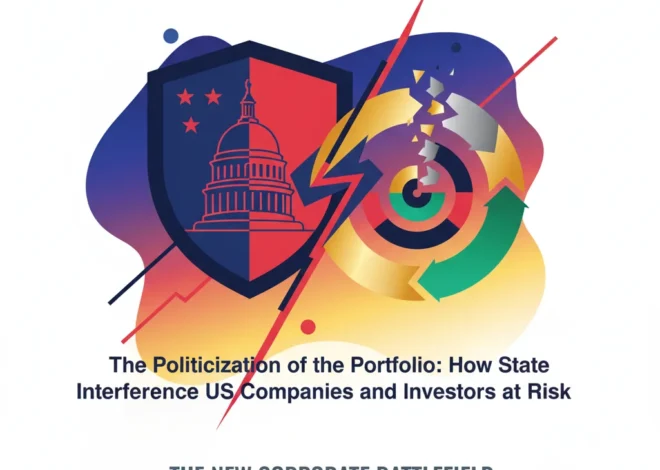
The Great French Exodus: How Political Uncertainty is Driving a Billion-Dollar Capital Flight
A Political Shockwave Rocks the French Economy
In the world of high-stakes finance and investing, stability is the most prized commodity. When the bedrock of political certainty cracks, the tremors are felt instantly in the stock market, in banking boardrooms, and in the private decisions of wealthy individuals. This is precisely the scenario unfolding in France following President Emmanuel Macron’s audacious—and to many, shocking—decision to call a snap legislative election. The move has plunged one of Europe’s core economies into a period of profound uncertainty, triggering a swift and decisive reaction from those with the most to lose: the nation’s wealthy investors.
Asset managers from Geneva to Luxembourg are reporting a dramatic surge in inquiries from affluent French clients, all seeking to move their capital to safer shores. The fear is palpable. A potential victory for either the far-right Rassemblement National (RN) or the far-left Nouveau Front Populaire (NFP) coalition could usher in an era of radical economic policy shifts, including wealth taxes, increased inheritance levies, and a general anti-business sentiment. As a result, a quiet but significant capital flight is underway, a financial exodus that speaks volumes about the intricate relationship between political risk and the global flow of money.
The Twin Threats Spooking the Markets
For investors, the current political landscape in France presents a classic “rock and a hard place” dilemma. The two main alternatives to Macron’s centrist bloc represent starkly different, yet equally concerning, economic futures.
- The Nouveau Front Populaire (NFP): This left-wing coalition has an economic platform that sends shivers down the spine of capital owners. Their proposals include the reintroduction of a wealth tax on assets, raising inheritance tax on large fortunes, and reversing Macron’s pro-business pension reforms. For investors, this signals a direct assault on wealth accumulation and preservation, making the domestic French economy a far less attractive place to hold assets.
- The Rassemblement National (RN): While Marine Le Pen’s far-right party has softened its anti-euro rhetoric, its economic policies remain a source of significant anxiety. Their nationalist, protectionist stance and promises of increased public spending without clear funding mechanisms have raised alarms about the country’s fiscal stability. The uncertainty alone is enough to deter long-term investment.
This political pincer movement has already left its mark on the financial markets. The CAC 40, France’s benchmark stock market index, has tumbled, and the spread between French and German 10-year government bond yields has widened significantly. This spread is a critical barometer of risk; a wider gap means investors are demanding a higher premium to hold French debt compared to ultra-safe German bunds, signaling a clear drop in confidence in the French economy. According to reports, this market reaction has been swift, with billions wiped off the value of French equities in the days following the election announcement (source).
The Appeal of the Safe Havens: Why Luxembourg and Switzerland?
As French investors look for sanctuary, two names consistently emerge: Luxembourg and Switzerland. These nations have cultivated reputations as bastions of financial stability, discretion, and sophisticated banking services for centuries. Their appeal lies in a combination of legal frameworks, political neutrality, and deep expertise in wealth management.
The primary vehicle being used for this capital transfer is a financial product known as “assurance vie” (life insurance). In a cross-border context, setting up a Luxembourgish or Swiss assurance vie contract allows a French resident to hold a diverse portfolio of assets—stocks, bonds, funds—legally outside of France. While the client still resides in France and the assets are often managed by their French-based advisor, the legal domicile of the capital is in a more stable jurisdiction. This provides a crucial layer of protection against potential future French capital controls or punitive tax laws.
Here’s a simplified comparison of why these jurisdictions are so attractive for wealth preservation:
| Feature | France | Luxembourg | Switzerland |
|---|---|---|---|
| Political/Economic Outlook | High uncertainty, potential for radical policy shifts. | Extremely stable, AAA-rated sovereign debt, pro-business environment. | Legendary political neutrality, strong currency (CHF), robust economy. |
| Wealth Management Framework | Subject to domestic tax changes (e.g., wealth tax). | Europe’s leading hub for cross-border funds. Strong “investor super-privilege” protecting assets even if the insurer fails. | Global leader in private banking, long history of asset protection and discretion. |
| Key Investment Vehicle | French Assurance Vie | Cross-border Assurance Vie | Private Banking Accounts, Trusts |
| Investor Sentiment | Negative / Fearful | Positive / Confident | Positive / Confident |
The Punk Rock Pivot: What a New Play Reveals About Fintech's Rebellion Against Traditional Finance
A “Tsunami” of Inquiries
The anecdotal evidence from the front lines of the banking industry is stark. Wealth managers in Luxembourg and Switzerland report being inundated with calls. Some private bankers have described a tenfold increase in daily inquiries from France since Macron’s announcement (source). Crucially, these are not just tentative explorations. Clients are actively opening accounts and initiating transfers, acting pre-emptively rather than waiting for the election results.
This proactive stance is a key differentiator from past events. It suggests that wealthy French families have learned from history and have a well-defined “playbook” for political risk. They understand that by the time a new tax law is passed, it may be too late to move assets efficiently. The goal is to have the capital legally domiciled elsewhere before any adverse legislation can be enacted. This involves a flurry of activity in private banking, legal, and advisory firms, all working to execute these complex cross-border financial strategies under immense time pressure.
Trump's Crypto Gambit: A New American Economy or a Political Masterstroke?
Echoes of the Past, Fears for the Future
For seasoned observers of the French economy, this situation is a case of historical déjà vu. The country has a long history of capital flight in response to left-wing governments.
- 1981: The election of Socialist François Mitterrand, who promised to nationalize banks and major industries, triggered a massive outflow of capital. The government was eventually forced to implement strict capital controls to stem the bleeding.
- 2012: François Hollande’s campaign promise of a 75% “super tax” on incomes over €1 million prompted another, albeit smaller, wave of financial and human departures, famously including actor Gérard Depardieu.
These past episodes have created an institutional memory among France’s high-net-worth population. They serve as cautionary tales about the vulnerability of domestically held wealth to political whims. The current exodus is built on the lessons of the past, but amplified by the speed of modern financial technology and the dual threat from both ends of the political spectrum.
The key question now is whether this is a temporary panic or the beginning of a sustained drain on the French economy. If a moderate, market-friendly government somehow emerges, the flows could slow or even reverse. But if a radical government takes power and implements its agenda, this initial trickle could become a flood. Such a scenario would not only hurt the wealthy but would also starve the French economy of much-needed investment capital, impacting everything from business expansion and job creation to the government’s ability to fund public services. The stakes in this election are not just political; they are profoundly economic, with consequences that will ripple through every level of French society and across the European Union.
The Unseen Threat to Your Portfolio: How Australian Superweeds Could Derail the Global Economy
The Final Word: A High-Stakes Economic Gamble
President Macron’s electoral gamble has inadvertently stress-tested the resilience of the French economy and the loyalty of its capital. The immediate reaction from investors has been clear and unambiguous: when faced with profound uncertainty, money will always seek safety. The rush to the financial havens of Luxembourg and Switzerland is a rational response to a high-risk political environment.
The coming weeks will be critical. The outcome of the election will determine whether France can restore investor confidence or if it will face a prolonged period of economic instability fueled by capital flight. This episode serves as a powerful reminder that in our globalized world, a nation’s economic health is inextricably linked to its political stability. For investors, finance professionals, and business leaders, the events in France are a case study in real-time on the critical importance of monitoring and managing political risk in any investment strategy.


